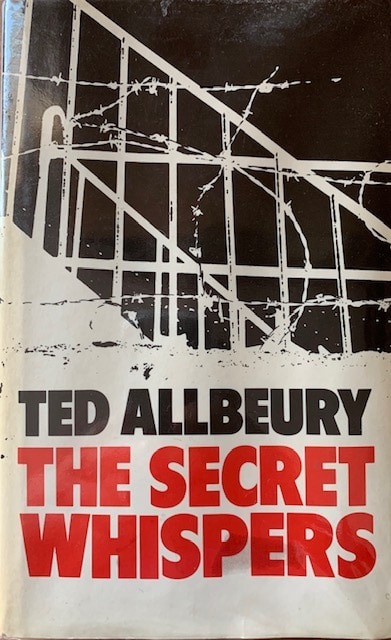THROWBACK THURSDAY: THE SECRET WHISPERS by Ted Allbeury (Granada, 1981)

When I started reviewing crime novels and thrillers for the Canberra Times back in 1982, the first book I was given to review was Ted Allbeury’s The Secret Whispers.
Ted Allbeury (1917-2005) was a former Intelligence operative who turned to thriller writing in the early 1970s. Although he has largely slipped from readers’ sights these days, in the 1970s to 90s he was highly regarded as one of Britain’s leading spy writers. His books were noted for their authentic spy craft and technical detail, although he was also capable of inventing quite original and clever plots, as with The Twentieth Day of January and The Man With The President’s Mind. He wrote over forty novels before his death in 2005. In 1981, when The Secret Whispers appeared, Allbeury was probably close to being at the peak of his skills, although he still had some very powerful novels in him, such as The Line Crosser (1993).
Now some thirty-seven years after I first reviewed The Secret Whispers, I thought I would re-read it and see whether my views are still the same.
Back in 1982 I wrote the following:
“The grim, stark cover of ‘The Secret Whispers’ gives some indication of the book within.
Ted Allbeury has achieved his reputation as being one of the leading exponents of the thriller genre by writing sombre tales about the espionage business. He worked for the British Intelligence Corps from 1940-1947 and consequently his novels resound with the sense of authenticity that only an insider can achieve. He is not merely satisfied with presenting accurate backgrounds and spying know-how, he also conveys how it feels to arrest a man, shoot at someone, assess an opponent, chase and be chased. However, unlike other agents who have turned to thriller writing, Allbeury does not allow the spying details to clutter up his novels to the extent that the story suffers.
Allbeury’s agents do not inhabit a jet-set world of flashy cars, exclusive restaurants and glamorous women; rather for them it is cheap hotels, takeaway meals and sad wives. His agents are not invincible superheroes, but rather unpretentious professionals who tend to be somewhat tragic. Allbeury devotes considerable attention to the private lives of the agents and demonstrates the separation between their private and professional lives.
In ‘The Secret Whispers’ we follow the career and deteriorating marriage of a British agent, David Miller, in the years following World War II. As Miller prepares to rescue a British controlled ‘mole’ from inside Cold War East Germany, he is confronted with crises in his private life.
This latest novel by Allbeury has the realism and character development we expect from his novels, but unfortunately it lacks the meticulous and imaginative plotting which made earlier novels, such as ‘The Twentieth Day of January’ so stimulating and enjoyable.
There is much in ‘The Secret Whispers’ which is reminiscent of his earlier novels and regular readers of Allbeury will find the plot and outcome somewhat predictable. This is not his best book, but it is still a good, intelligent thriller.”
On re-reading The Secret Whispers, I was struck by how flat the writing was. Unlike a lot of recent spy novels, it was very unemotional and Allbeury paints a depressing picture of Miller’s home life in a simple, undramatic manner. Allbeury conveys well the difficulty of a spy’s life, but the character development did not seem as strong to me now, as it did in 1982. The emotional involvement gets stronger as the novel progresses and in the final sections Allbeury effectively and simply limns the fear and frustration of Miller and his mole. He is also effective at conveying that sense of ‘good people doing nasty things for the right reasons’ in a dispassionate manner. It has been a long time since I read an Allbeury novel, so I did not get the same sense of familiarity which I had from reading a lot of his novels in the early 1980s. Although I did notice Allbeury’s use of scenes and descriptions which he would repeat almost word for word in other books, such as this one:
“On Sundays, the two museums cater for the walking wounded. Divorced or separated fathers generally end up with Sunday as their access day to their children. Conversations are difficult and stilted…Those few hours that are so looked forward to become a desert of grey sand, a mental gymkhana, the wages of guilt.”
The plotting of The Secret Whispers was reasonably straight-forward and logical, but it did hang on an unlikely coincidence. It is not a briskly paced novel, but it moves along well and benefits from being a much shorter book than we have come to expect in recent years. The early scenes set in World War II are particularly effective and obviously benefitted from Allbeury’s wartime experiences. The tension mounts considerably in the final chapters and I thought that the ending was more surprising and powerful than I did in 1982.
In all I agree with what I said in 1982, it is a good, intelligent thriller. I enjoyed it and will go back and read, or re-read, some more of his books.
An interesting side, Allbeury’s novel The Twentieth Day of January was published in 1980, but in recent years it has attracted some media attention because of its central conceit that the President-elect of the United States may actually be a puppet of the Soviet Union. In 1980 it seemed far-fetched, nowadays some would say it has gained in credibility!
